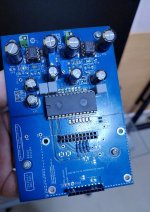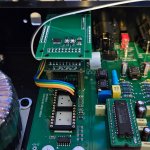Update on the stock:
Pico v2 ISO version + reclock: 10pcs manufactured and shipped, expected to be in stock on Tuesday
Pico v2: 2pcs left, going to put new order next week
Pico v2 ISO version + reclock: 10pcs manufactured and shipped, expected to be in stock on Tuesday
Pico v2: 2pcs left, going to put new order next week
Hi @trungdtmc
It same as for adau1452, it can use both SPI and I2C but the default protocol is I2C. Here is screenshot from the datasheet:

It same as for adau1452, it can use both SPI and I2C but the default protocol is I2C. Here is screenshot from the datasheet:
Ha-ha, yes indeed 😀 It looks even cooler with MEMS clocks in plastic packages.Black is an upgrade!!!! 😆
The only downside is production cost: for a small batch like this JLCPCB offers economy but only for green mask.
For the non-isolated version it does not matter because I normally order in bigger batches.
But it is ok, I keep same price. And no guarantees on color for the next batch, depends on the demand 🙂
A bit of updates on the project.
In recent months there were many fixes of the firmware related to issues in different operating systems: Windows, MacOS, Linux, Android, iOS.
With around 50 devices in the field now, at some I was getting some kind of bug report pretty much every week 🙂
That was challenging but at the same time very helpful to identify and fix the bugs. So I would like to say thank you everyone again for every bug report.
From the very beginning I wanted entire project to be cross-platform and run on Win/MacOS/Linux and mobile OS. I think at this point the audio related stuff is quite mature. However there are still things that I want to add in the future.
One of the missing parts for the cross-platform operation is the config tool: now it only runs under Windows.
Recently I did a lot of code clean up in the config tool to separate OS-dependent stuff from the rest.
With that, now the tool also becoming cross-platform.
Along with that, I am going to make some of the HID API public and provide code examples to do i2c/gpio transactions:

In recent months there were many fixes of the firmware related to issues in different operating systems: Windows, MacOS, Linux, Android, iOS.
With around 50 devices in the field now, at some I was getting some kind of bug report pretty much every week 🙂
That was challenging but at the same time very helpful to identify and fix the bugs. So I would like to say thank you everyone again for every bug report.
From the very beginning I wanted entire project to be cross-platform and run on Win/MacOS/Linux and mobile OS. I think at this point the audio related stuff is quite mature. However there are still things that I want to add in the future.
One of the missing parts for the cross-platform operation is the config tool: now it only runs under Windows.
Recently I did a lot of code clean up in the config tool to separate OS-dependent stuff from the rest.
With that, now the tool also becoming cross-platform.
Along with that, I am going to make some of the HID API public and provide code examples to do i2c/gpio transactions:
It is stated in the manual it does support.. Maybe I am missing something. I will try again when i have the time.Hi
Does York Pico support TDA1541 in simultaneous mode?
But I am aware that JLSounds has a specific configuration just for TDA1541, and the CPLD by Miro also has a specific program written for the TDA1541, on top of the usual 16 bit ones for the other DAC like PCM56, AD1851, AD1856. It could be because the TDA1541 requires data to be in offset binary , vs the two complements of the other 16-bit DAC chips.
Last edited:
Shipped today, thank you!I just ordered one, hoping to get good use out of it with adau1467
Yes indeed, this one it in my backlog for a long time now. I'll try to implement it this week.Another task for evlipsevl 🙄
Great support so far!Yes indeed, this one it in my backlog for a long time now. I'll try to implement it this week.
In the past couple of weeks I was thinking about introduction of some kind of firmware release procedures and overall task tracking.
For source code control I used git but not really. For a long time everything was done in one branch and commit frequency wasn't great.
In next couple of days I'll write a post about the new firmware release procedure and how the development is organized now.
Github also has functionality for issue tracking so I added one. Here is how it looked after one week 🙂

For source code control I used git but not really. For a long time everything was done in one branch and commit frequency wasn't great.
In next couple of days I'll write a post about the new firmware release procedure and how the development is organized now.
Github also has functionality for issue tracking so I added one. Here is how it looked after one week 🙂
I confirm, york manages 3 ADAU1467 in master/slave.I just ordered one, hoping to get good use out of it with adau1467
A quick update on the TDA1541 sim mode support: after a bit more abuse of the MCU peripherals it works now:

The firmware is not uploaded yet, I need to merge the changes to the main branh and update config tool to support the new mode.
I think it will be available early next week.
The firmware is not uploaded yet, I need to merge the changes to the main branh and update config tool to support the new mode.
I think it will be available early next week.
Run couple more experiments without 'stop clock', as @diyiggy requested:

Here it implements 16 bit clocks/sample. The waveform is a bit different from datasheet, the latch signal is wider than specified:

So far experiments show that TDA1541 is fine with that but need to run more experiments to make sure that LSBs are fine.
Here it implements 16 bit clocks/sample. The waveform is a bit different from datasheet, the latch signal is wider than specified:
So far experiments show that TDA1541 is fine with that but need to run more experiments to make sure that LSBs are fine.
- Home
- Vendor's Bazaar
- USB UAC2+HID Multichannel input/output interface York

